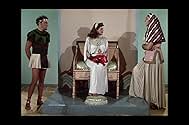Ostensibly set in the Arabian desert, the third in a series of highly profitable films produced by Universal with Maria Montez, Jon Hall, and Turhan Bey (the other two being ARABIAN NIGHTS (1942), and ALI BABA AND THE FORTY THIEVES (1944), SUDAN is a formulaic romance with a disguised princess sold into slavery (Montez), a rebel leader suspected of killing her father (Bey) and a pickpocket with romantic intentions (Hall) aided and abetted by his comic sidekick (Amdy Devine). Add to that George Zucco in one of his hissable villain roles - and ludicrous costumes - and you have all the ingredients for another rip-roaring epic with plenty of fights and a rousing musical score (by Milton Rosen).
In truth John Rawlins's production doesn't have much to do with the mystic East. Shot in and around Los Angeles, its chase-sequences, with horses galloping across the sun-drenched desert, have more in common with the Western. Likewise the shots of the lovers (Montez, Bey) embracing in the mountains at night, with the peaks stretching like fingers into cloudless skies.
The story has clear propaganda elements: at one point Bey's Herua talks about ridding the world of "evil hours" while ensuring that his people will make Naila (Montez) "forget what has happened." When the villains have been vanquished, and the lovers ride off into the sunset, a heavenly choir strikes up another patriotic song praising freedom that exists like "the wild wind," protecting a people "always proud and free," and "that's the way we will remain," "fighting together for ever." The two lovers might be non-white (in the accepted racial sense of the term), but Rawlins's film projects a transcultural message; in the peace following six years of bitter war everyone, regardless of their ethnicity, will be able to live together harmoniously.
This wish might be idealistic, but it provides a suitably climactic coda to a highly entertaining adventure that is more about America's future than elsewhere.

































